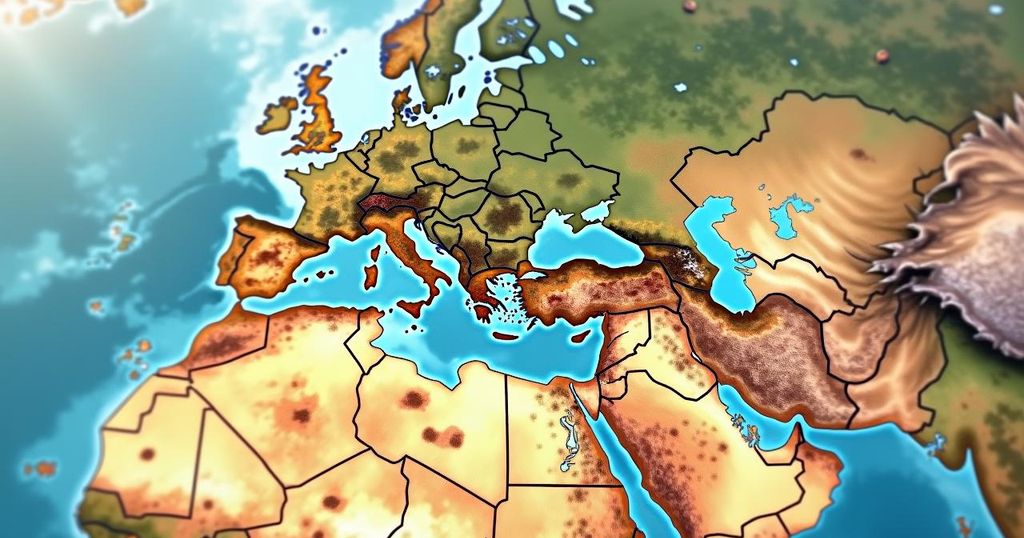Ambitions for ‘Greater Israel’: Smotrich’s Calls for Territorial Expansion
Bezalel Smotrich, the Israeli Finance Minister, has called for extending Israel’s borders to include territories such as Damascus and parts of Saudi Arabia as part of a ‘Greater Israel’ vision. His statements reflect a broader far-right sentiment within the Israeli government, particularly following recent military escalations in Gaza that have led to severe humanitarian crises. The international community is observing these developments closely, amidst growing calls for accountability in light of the ongoing violence.
The Israeli Finance Minister, Bezalel Smotrich, recently articulated a troubling vision for Israel’s territorial expansion, calling for the nation’s borders to extend not only to the Jordan River but also to include Damascus in Syria and territories extending through to Iraq and Saudi Arabia. In an interview with the Franco-German Arte Reportage as part of a documentary titled “Israel: Extremists in Power,” Smotrich stated that his aspiration is to maintain a Jewish state aligned with the values of the Jewish people. When questioned about the potential for border expansion, he acknowledged the idea with a smile, indicating a gradual approach. He noted, “It is written that the future of Jerusalem is to expand to Damascus,” thereby underscoring a belief that Jerusalem’s rightful claim reaches far beyond its current borders. The documentary’s narrator commented on Smotrich’s radical vision, highlighting that it encompasses not only Palestinian territories but also lands within Jordan, Syria, Lebanon, Iraq, Egypt, and even Saudi Arabia. Such extremist views have regrettably found a platform within mainstream Israeli public discourse, especially in light of recent escalations surrounding the Gaza conflict. Israeli leaders, including Prime Minister Benjamin Netanyahu, have openly supported the notion of a “Greater Israel.” At a recent United Nations General Assembly meeting, Netanyahu displayed maps that unequivocally represented the occupied West Bank and Gaza as integral parts of Israel. This rhetoric has intensified following the military actions in Gaza that began on October 7, which have led to widespread human rights violations and significant international condemnation. As military actions continue, human suffering has escalated dramatically, with reports indicating that over 42,000 Palestinians have been killed and tens of thousands more have been injured since the onset of hostilities. The ongoing violence has resulted in a dire humanitarian crisis marked by famine and the displacement of nearly two million Palestinians, who have been forced from their homes in search of safety. This situation bears a striking resemblance to the historical Nakba of 1948, signifying a deeply troubling chapter in the ongoing Israeli-Palestinian conflict.
The concept of ‘Greater Israel’ has long been a part of political discourse within certain sectors of Israeli society, particularly among right-wing factions. This ideology advocates for the expansion of Israeli borders to encompass all historical lands regarded as part of the Jewish homeland, which includes parts of modern-day Jordan, Lebanon, Syria, and even further afield. In recent years, with the escalation of tensions in the Gaza Strip and the resurgent voices of extremist politicians, this ideology has gained renewed prominence. The current Israeli government, which includes several far-right members, appears increasingly supportive of territorial claims, which they assert are historically and religiously justified. This stance has garnered international attention, particularly as Israel grapples with the consequences of its military actions in Gaza and the resulting humanitarian crisis.
In conclusion, the ongoing rhetoric from leaders like Bezalel Smotrich regarding the expansion of Israeli borders raises significant concerns about peace and stability in the region. As claims for a ‘Greater Israel’ resonate within a portion of Israeli society, the resulting actions against Palestinians in Gaza have led to catastrophic humanitarian consequences. With international scrutiny intensifying, it remains imperative for all parties involved to prioritize dialogue and diplomatic engagement over militaristic ambitions.
Original Source: www.palestinechronicle.com




Post Comment